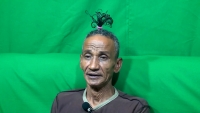Francisco Osorio Claro
* 1963
-
“I was just talking with Abel López [Abel López Pérez, a former politician prisoner and member of the ‘Youth Cuban Movement for Democracy’ [Movimiento Cubano de Jóvenes por la Democracia] and the ‘Council of Human Rights Rapporteurs’ [Consejo de Relatores de Derechos Humanos]] about our brother who had died in Santiago de Cuba in a hunger strike, Wilmar Villar Mendoza [an opponent of the communist regime, who died in 2012 on a 50-day hunger strike]. When Villar died, we decided to march in the streets of Guantanamo demanding justice for his death. The day after the demonstration, we activists met at the Abel’s house, but Abel did not appear. I saw a police patrol pass by his house and I told to everybody: ‘Brothers, it is time to march again, let’s go to the street now, we have to take over the streets and demand justice for Wilmar Villar Mendoza.’ We run outside, and it was that time when the Major Giovanni was fighting with me to take away my poster with anticommunist slogans.”
-
“Well, let me describe the situation, while leaving Cuba through the Mariel port in 1980, those women who wanted to emigrate, they had to proclaim, that they were leaving the country because they were lesbians. Just like I am telling you. Men had to declare they were gays. Because the Government forced them. As a consequence, the common people on the street, they just stopped us emigrants in front of the butcher shop and started to throw eggs on us and shouted: ‘Cubans, like owls, you change Cuba for new jeans. Fidel will score, does not matter with what you hit. Ping Pong go away you are just worms.’ I still remember everything.”
-
“Not long time ago when I started to feel better after my illness, I was in the Caribe district [a neighborhood of the city of Guantanamo] in a recreational area. When I arrived there, without having any suspicion, I was attacked with a machete. Someone just attacked me harshly, I found out later that it was a group called ‘The gang of three’. Unexpected, without any hunch, because I have no enemy among youth in Guantanamo, I have no problem with anybody. I attended to the hospital in Guantanamo, on the 9th street, between eleven and twelve avenues, in the Carlos Manuel district. I sought for a check out at the hospital and, I presented myself at the police station to make my statement, that was after three days of the incident, when I felt better. I declared my accusations. ‘Hey, you should have killed him, he is a counterrevolutionary.’ That is what I heard, in a police office, and some official, the Captain said: ‘No, justice must be done, because this man came here to announce a physical attack and we must insist on the justice.’ And I heard when someone else inside the office replied: ‘No guys, what you should have done is to kill him, he is a counterrevolutionary.’ So, nothing happened with my declaration.”
-
“Well, that was horrible there [in the Boniato prison in Santiago de Cuba]. The prisoners were fighting gang against gang, stabbing each other, the police did not enter, they just announced through the loud-speaker: ‘Attention, attention to the penal population, put the corpses at the door number one’. And later, when the situation calmed little bit, the police entered and transferred injured inmates to the Hospital 15 Sur, because at that time the Agustín Honesto hospital did not exist yet. What we lived there was horrible, they destroyed the youth, all the young boys, there were always two or three dead young ones among all dead prisoners, also because of insufficient nutrition. We had to sleep in the beds with all types of bugs, they bit you, there were cockroaches and no hygiene at all. It was a real savagery how we used to live there at that time.”
-
Celé nahrávky
-
Cuba, 02.07.2020
(audio)
délka: 01:27:24
Celé nahrávky jsou k dispozici pouze pro přihlášené uživatele.
„I will always express the truth, and as many times as necessary, I will march on the streets to transmit to the people that I defend democracy in Cuba!“
Francisco Osorio Claro was born in 1963 in the city Guantanamo. When he was sent to prison for the first time, he was just 11 years old. He has thrown a stone on the Cuban flag. Since then, he has spent more than ten years of his life in various Cuban prisons for his activities as an opponent of the communist regime in Cuba. In 1980 he was forced to leave the country, so he emigrated to the United States. He resided there until 1992 when he decided to return to Cuba. In his homeland, surprised by the political and economic situation, he joined the peaceful counterrevolutionary movement, and today he is an active opponent against the communist regime. He also supports his sister Celina Osorio Claro, the coordinator of the human rights movement “Ladies in White” [Las Damas de Blanco] in Guantanamo. He lives with his family in Guantanamo.
